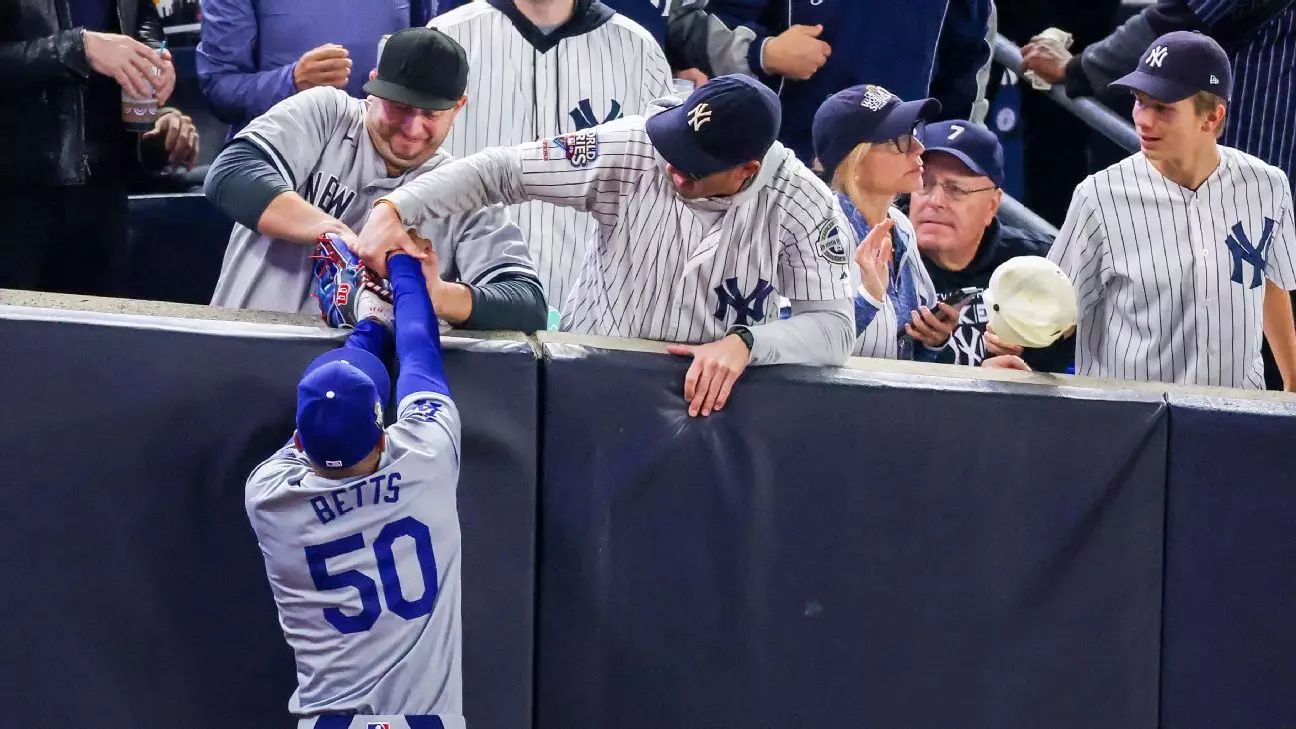The World Series, a pinnacle of excitement and competition in Major League Baseball, witnessed an unusual and controversial incident during Game 4 held at Yankee Stadium. This event not only encapsulated the electrifying atmosphere of the championship series but also raised questions about fan behavior and the impact it can have on the game.
The chaotic moment unfolded when Mookie Betts, the standout right fielder for the Los Angeles Dodgers, made a commendable leap toward the outfield wall to snag a popup hit by Gleyber Torres. This routine play took an unexpected turn as Austin Capobianco, seated in the front row, interfered by prying the caught foul ball out of Betts’ glove. In a startling display of audacity, Capobianco, alongside his companion John Peter, engaged in a manner that defied the unwritten rules of fan conduct. Their actions directly led to Torres being called out for fan interference by the right-field umpire, highlighting a unique intersection of fan involvement and game rules.
Understandably, Betts reacted with visible frustration as he immersed himself in the challenge of the game and the complexities fans can introduce into on-field dynamics. His indignation was palpable, given the circumstances that unfolded. However, after the game, he chose to address the matter with remarkable composure, stating that the outcome of the event was inconsequential; the team’s defeat weighed more heavily on him than the blunder caused by enthusiastic fans. He encapsulated a professional athlete’s resilience by emphasizing the need to move forward.
Contrarily, Capobianco reflected a tone of pride in his actions, admitting he was aware of the potential repercussions but proceeded anyway with a sense of bravado. His comments post-game revealed a mentality that perhaps many would perceive as harmless fan loyalty, but the line between support and interference became increasingly blurred. This incident serves as a cautionary tale about the responsibilities that come with being an engaged fan, especially in high-pressure scenarios like the World Series.
The notion of fan interference is not unfamiliar in baseball; however, the manner in which it manifests can often polarize opinions. There were immediate implications for the game, with the Dodgers leading due to Freddie Freeman’s prior homer, yet they soon found themselves overwhelmed, ending the game with an 11-4 loss to the Yankees. The stark contrast between the Dodgers’ encouraging start and their unraveling performance in the latter stages raises queries about how such fan-related disturbances can affect players mentally and strategically.
Remarkably, this wasn’t the first time Torres encountered fan interference in this series, creating a narrative around his at-bats that fans are unlikely to forget anytime soon. In Game 1, he experienced a similar situation that cost him a significant hit, which undeniably shapes how players approach future at-bats. These repeated distractions raise a broader question about the role of fans in the sport: When does supportive energy transform into an obstacle for players striving for excellence?
Indeed, the incident raises critical questions regarding stadium policies and fan engagement during pivotal moments in sporting events. Major League Baseball, alongside individual franchises, may need to reassess regulations and guidelines to ensure that while fans remain an integral part of the game experience, their enthusiasm doesn’t cross boundaries that compromise the integrity of competitive play.
As Yankee Stadium gears up for Game 5 of the World Series, the lingering implications of this incident will inevitably be a topic of discussion, drawing attention to the ever-evolving relationship between sports, fans, and the pursuit of championship glory. With Capobianco and Peter set to return after their brief ejection, it will be interesting to see how this plays out both for them and the players affected, as the stakes continue to rise in America’s beloved pastime.


Leave a Reply